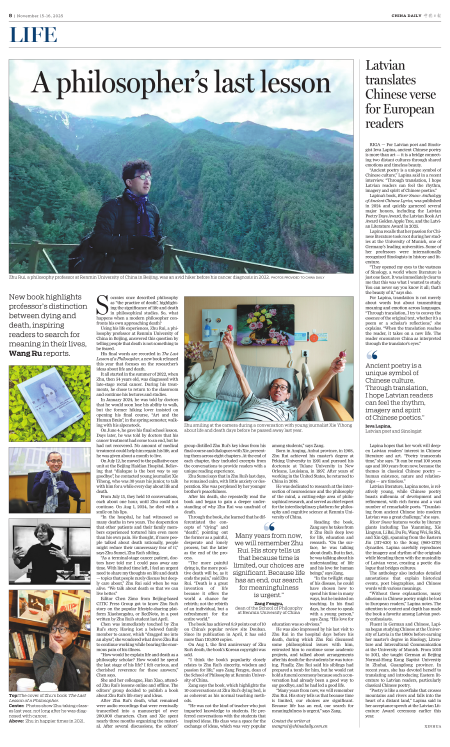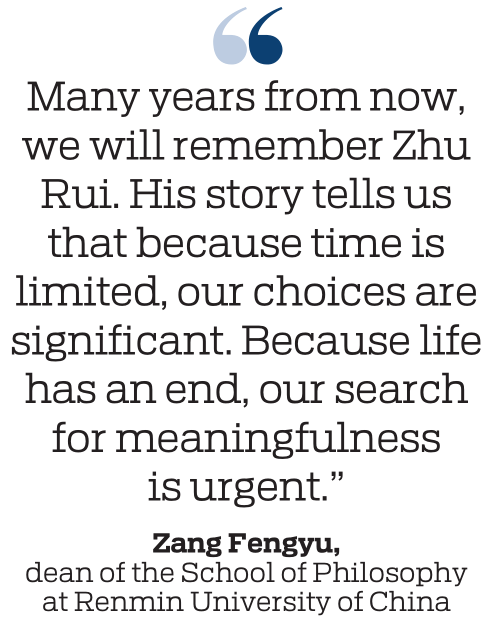
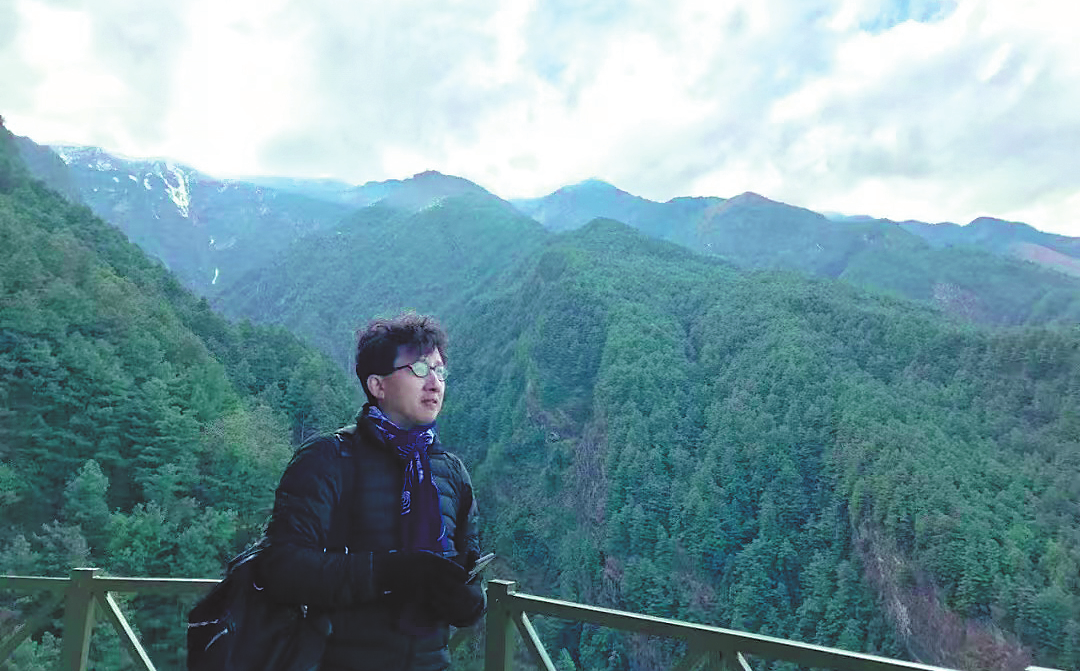
china daily
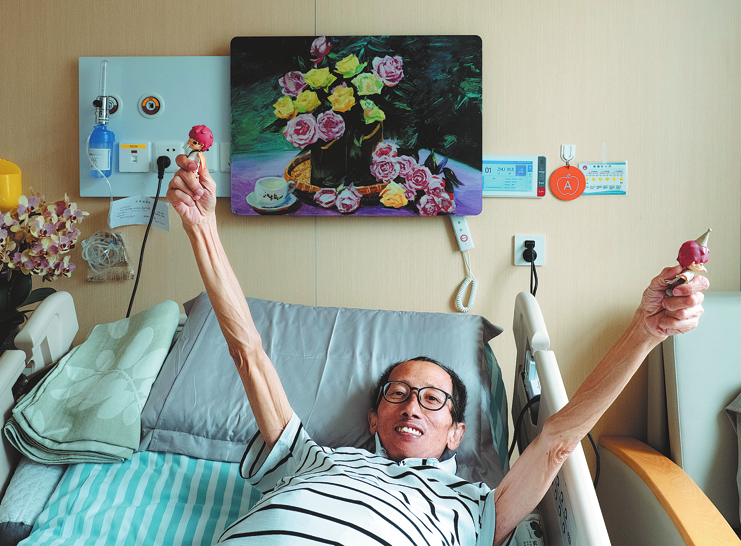
Zhu smiling at the camera during a conversation with young journalist Xie Yihong about life and death days before he passed away last year.
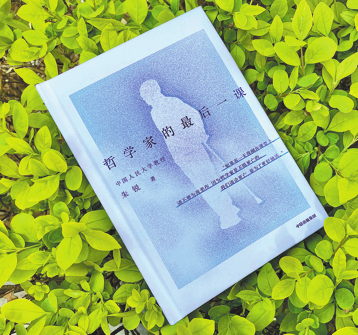
The cover of Zhu's book The Last Lesson of a Philosopher.
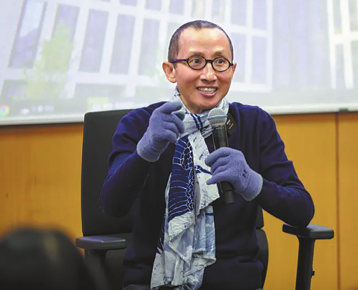
Photos show Zhu taking classes last year, not long after he was diagnosed with cancer.
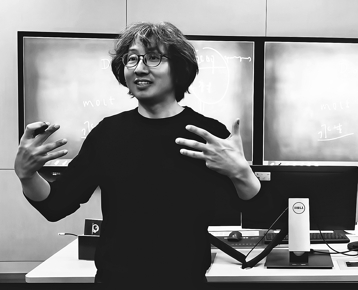
Photos show Zhu taking classes last year, not long after he was diagnosed with cancer.
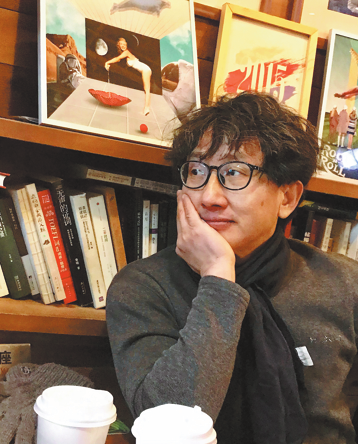
Zhu in happier times in 2021.
Socrates once described philosophy as "the practice of death", highlighting the significance of life and death in philosophical studies. So, what happens when a modern philosopher confronts his own approaching death?
Using his life experiences, Zhu Rui, a philosophy professor at Renmin University of China in Beijing, answered this question by telling people that death is not something to be feared.
His final words are recorded in The Last Lesson of a Philosopher, a new book released this year that focuses on the researcher's ideas about life and death.
It all started in the summer of 2022, when Zhu, then 54 years old, was diagnosed with late-stage rectal cancer. During his treatments, he chose to return to the classroom and continue his lectures and studies.
In January 2024, he was told by doctors that he would soon lose his ability to walk, but the former hiking lover insisted on opening his final course, "Art and the Human Brain", in the spring semester, walking with his alpenstock.
On June 4, he gave his final school lesson. Days later, he was told by doctors that his cancer treatment had come to an end, but he had not recovered. No amount of medical treatment could help him regain his life, and he was given about a month to live.
On July 12, he moved to the palliative care unit at the Beijing Haidian Hospital. Believing that "dialogue is the best way to say goodbye", he contacted young journalist Xie Yihong, who was 30 years his junior, to talk with him for a while every day about life and death.
From July 15, they held 10 conversations, each about one hour, until Zhu could not continue. On Aug 1, 2024, he died with a smile on his lips.
"In the hospital, he had witnessed so many deaths in two years. The desperation that other patients and their family members experienced tortured him even more than his own pain. He thought, if more people talked about death rationally, people might reduce their unnecessary fear of it," says Zhu Sumei, Zhu Rui's sibling.
"As a terminal-stage cancer patient, doctors have told me I could pass away any time. With limited time left, I feel an urgent need to share my thoughts on life and death — topics that people rarely discuss but deeply care about," Zhu Rui said when he was alive. "We talk about death so that we can live better."
Editor Chen Zimo from Beijing-based CITIC Press Group got to know Zhu Rui's story on the popular lifestyle-sharing platform Xiaohongshu, or RedNote, in a post written by Zhu Rui's student last April.
Chen was immediately touched by Zhu Rui's story. Having lost a beloved family member to cancer, which "dragged me into an abyss", she wondered what drove Zhu Rui to continue working while bearing the enormous pain of his illness.
"How would he explain life and death as a philosophy scholar? How would he spend the last stage of his life? I felt curious, and cherished reverence for these answers," Chen says.
She and her colleague, Han Xiao, attended Zhu Rui's lessons online and offline. The editors' group decided to publish a book about Zhu Rui's life story and ideas.
After Zhu Rui's death, what remained were audio recordings that were eventually transcribed into a manuscript of over 200,000 characters. Chen and Xie spent nearly three months organizing the material. After several discussions, the editors' group distilled Zhu Rui's key ideas from his final course and dialogues with Xie, presenting them across eight chapters. At the end of each chapter, they included excerpts from the conversations to provide readers with a unique reading experience.
Zhu Sumei says that in Zhu Rui's last days, he remained calm, with little anxiety or desperation. She was perplexed by her younger brother's peacefulness.
After his death, she repeatedly read the book and began to gain a deeper understanding of why Zhu Rui was unafraid of death.
Through the book, she learned that he differentiated the concepts of "dying" and "death", pointing out the former as a painful, desperate and lonely process, but the latter as the end of the process.
"The more painful dying is, the more positive death will be, as it ends the pain," said Zhu Rui. "Death is a great invention of life because it offers the world a chance for rebirth; not the rebirth of an individual, but a refreshment for the entire world."
The book has achieved 8.9 points out of 10 on China's popular review site Douban. Since its publication in April, it has sold more than 110,000 copies.
On Aug 1, the first anniversary of Zhu Rui's death, the book's Korean copyright was sold.
"I think the book's popularity closely relates to Zhu Rui's sincerity, wisdom and passion for life," says Zang Fengyu, dean of the School of Philosophy at Renmin University of China.
Zang says the book, which highlights the 10 conversations at Zhu Rui's dying bed, is as coherent as his normal teaching methods.
"He was not the kind of teacher who just imparted knowledge to students. He preferred conversations with the students that inspired ideas. His class was a space for the exchange of ideas, which was very popular among students," says Zang.
Born in Anqing, Anhui province, in 1968, Zhu Rui achieved his master's degree at Peking University in 1991 and pursued his doctorate at Tulane University in New Orleans, Louisiana, in 1997. After years of working in the United States, he returned to China in 2018.
He was dedicated to research at the intersection of neuroscience and the philosophy of the mind, a cutting-edge area of philosophical research, and served as chief expert for the interdisciplinary platform for philosophy and cognitive science at Renmin University of China.
Reading the book, Zang says he takes from it Zhu Rui's deep love for life, education and research. "On the surface, he was talking about death. But in fact, he was talking about his understanding of life and his love for human beings," says Zang.
"In the twilight stage of his disease, he could have chosen how to spend his time in many ways, but he insisted on teaching. In his final days, he chose to speak with a young person," says Zang. "His love for education was so obvious."
He was also impressed by his last visit to Zhu Rui in the hospital days before his death, during which Zhu Rui discussed some philosophical issues with him, entrusted him to continue some academic projects, and talked about arrangements after his death for the students he was tutoring. Finally, Zhu Rui said his siblings had prepared a tomb for him, but he would not hold a funeral ceremony because such a conversation had already been a good way to say goodbye, and he had led a good life.
"Many years from now, we will remember Zhu Rui. His story tells us that because time is limited, our choices are significant. Because life has an end, our search for meaningfulness is urgent," says Zang.
Contact the writer at wangru1@chinadaily.com.cn
Zhu Rui, a philosophy professor at Renmin University of China in Beijing, was an avid hiker before his cancer diagnosis in 2022.
